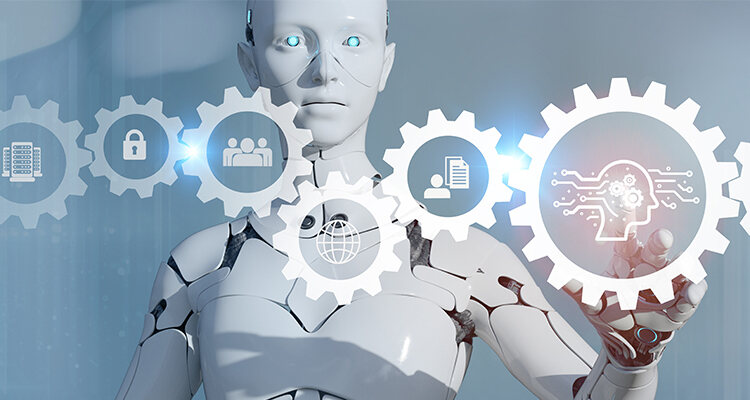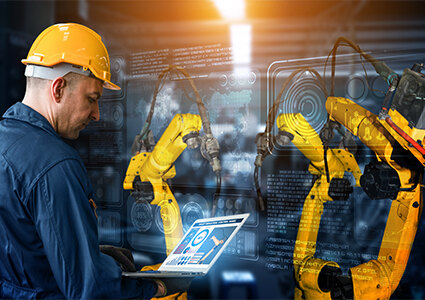
John Lanza, partner and intellectual property lawyer with Foley & Lardner LLP discusses the advantages of generative AI in manufacturing
Manufacturing processes and technology are characterized by moments of “revolutionary” change, followed by “evolutionary” optimization until the next “revolution” occurs. The assembly line revolutionized manufacturing in the early 20th century by increasing production efficiency, lowering production costs, standardizing production, and increasing speed to market. Firms that were unable to adopt the assembly line approach fell behind those that did and, in doing so, failed economically because they were unable to compete in terms of product availability, pricing and reliability. A new moment of revolutionary change is upon us, powered by generative AI models, of which the ChatGPT model is the most well-known. As was the case with the assembly line, firms that successfully adopt generative AI models will have a significant competitive advantage in production efficiency, production cost, quality control and speed to market.

Production efficiency
By dividing the manufacturing process into smaller, repetitive tasks performed by specialized workers, production speed and output soared. Manufacturers using the assembly line could produce goods at a much faster rate compared to traditional methods, giving them a competitive edge in meeting market demand. Similarly, generative AI models can be used to optimize production line operations by analyzing data and production parameters from various sensors to identify bottlenecks, optimize production schedules, and recommend process improvements to increase production efficiency.
Production cost
The assembly line led to reduced production costs by streamlining processes, minimizing wasted time and materials, and optimizing worker efficiency, all of which translated into cost savings. In like manner, generative AI models can be used to predict and prevent equipment failures by analyzing historical data from sensors and maintenance records. Identification of patterns indicative of impending failures enables manufacturers to schedule proactive maintenance, reduce downtime, and optimize the lifecycle of their machinery, all of which increases throughput, minimizes waste, and improves overall productivity. These advantages result in cost savings, which enables lower prices, allowing early adopters to squeeze out competitors who cannot match the cost-effectiveness of an AI-enabled manufacturing process.
Quality control
The assembly line allowed for standardized production, ensuring consistency in product quality and creating a perception of higher reliability and trust in products produced via assembly line methods. Generative AI models can analyze images or sensor data to improve quality control processes by automatically identifying defects or anomalies in products. Generative AI models can quickly identify deviations from the desired specifications, enabling manufacturers to take corrective actions in real-time.
Speed to market
Just as the assembly line enabled manufacturers to bring products to market faster by reducing the time between product conception and availability in the market, generative AI models can optimize supply chain operations by analyzing vast amounts of data related to demand forecasts, inventory levels, transportation routes, and supplier performance. These models can identify optimal inventory levels, suggest efficient transportation routes, and optimize procurement decisions, leading to reduced costs, improved delivery times, and enhanced overall supply chain efficiency. This advantage will enable manufacturers to respond more swiftly to changing consumer demands and capitalize on market trends, leaving non-adopters struggling to keep pace.
 Promising new technology presents new legal questions to be considered. For example, the assembly line posed new questions relating to employer-employee relations, worker safety issues, antitrust and monopolistic practices, and product liability. Some of the new legal issues presented by the use of generative AI technologies include intellectual property rights, data privacy and security issues, ethical and bias considerations, and regulatory compliance concerns.
Promising new technology presents new legal questions to be considered. For example, the assembly line posed new questions relating to employer-employee relations, worker safety issues, antitrust and monopolistic practices, and product liability. Some of the new legal issues presented by the use of generative AI technologies include intellectual property rights, data privacy and security issues, ethical and bias considerations, and regulatory compliance concerns.
Intellectual property rights
Generative AI systems have the potential to create new designs, artworks, or other creative outputs. It is crucial that manufacturers ensure that the AI-generated outputs do not infringe upon existing copyrights, trademarks, or patents. Additionally, manufacturers should clarify ownership and licensing rights for the AI-generated content and consider whether and how to register any new intellectual property created by the AI system.
Data privacy and security
Generative AI often requires vast amounts of data to train models effectively. Manufacturers need to be aware of the data privacy and security implications associated with collecting, storing, and processing such data, implement appropriate security measures to protect the data from unauthorized access or breaches, and have an action plan should a data breach occur. The standard practice of conducting “tabletop” exercises to stress test data breach response plans may be an alien concept for manufacturers.
Liability and accountability
When using generative AI in manufacturing processes, questions may arise regarding liability and accountability. If AI-generated designs or models result in defects, malfunctions, or harm to consumers, it can raise legal issues. Manufacturers should clarify the responsibility and potential liability for any issues arising from the AI system’s outputs. This may involve considering product liability laws, ensuring appropriate disclaimers, or establishing contracts with clear terms and limitations.
Compliance with regulations
Manufacturers must ensure that their use of generative AI complies with applicable regulations and industry standards. Depending on the sector and the products involved, specific regulations may apply, such as safety regulations, industry-specific standards, or labeling requirements. Moreover, the data necessary to fuel generative AI models may require compliance with regulations, such as the European General Data Protection Regulation (GDPR).
Generative AI models are reshaping how a successful manufacturer looks. While there are certainly questions that need to be addressed when implementing generative AI technologies, the potential benefit is simply too great to ignore. Firms that adopt generative AI will outpace competitors that do not, in the same way that assembly-line manufacturers outpaced their non-adopting competitors. As the author, Nicky Verd, says: “You cannot stop the Fourth Industrial Revolution, but you can influence its direction and impact on your life.”
For a list of the sources used in this article, please contact the editor.
John Lanza
www.foley.com/en
Foley & Lardner LLP is a preeminent law firm that stands at the nexus of the energy, health care and life sciences, innovative technology, and manufacturing sectors. The firm looks beyond the law to focus on the constantly evolving demands facing its clients and acts as trusted business advisors to deliver creative, practical, and effective solutions. Its 1100 lawyers across 25 offices worldwide partner on the full range of engagements from corporate counsel to IP work and litigation support, providing clients with a one-team solution to all their needs.